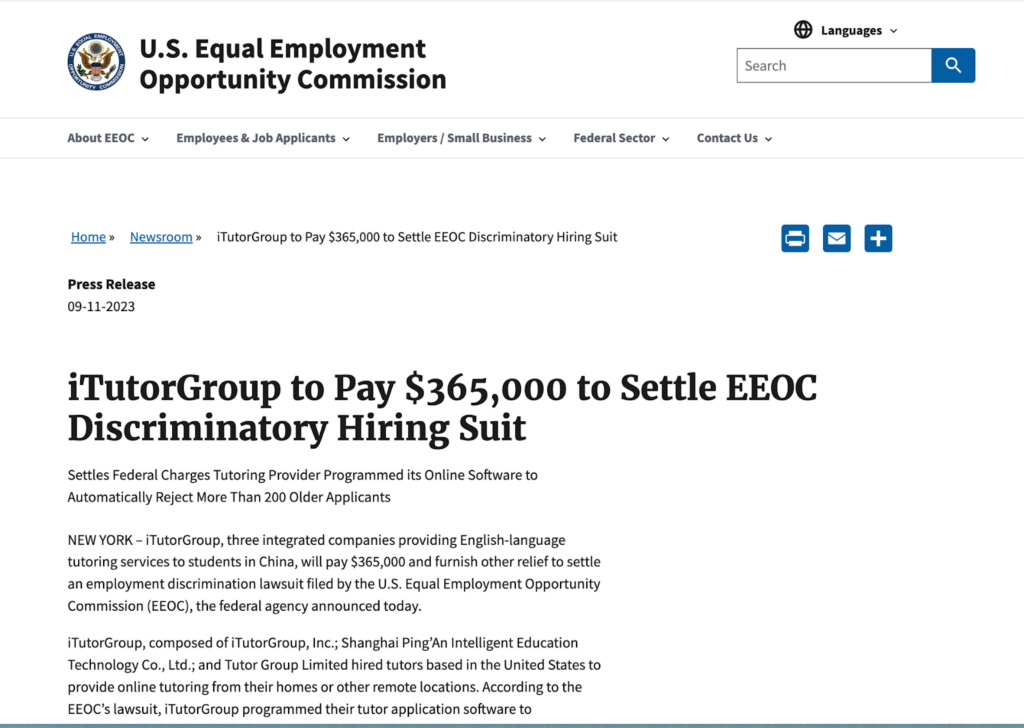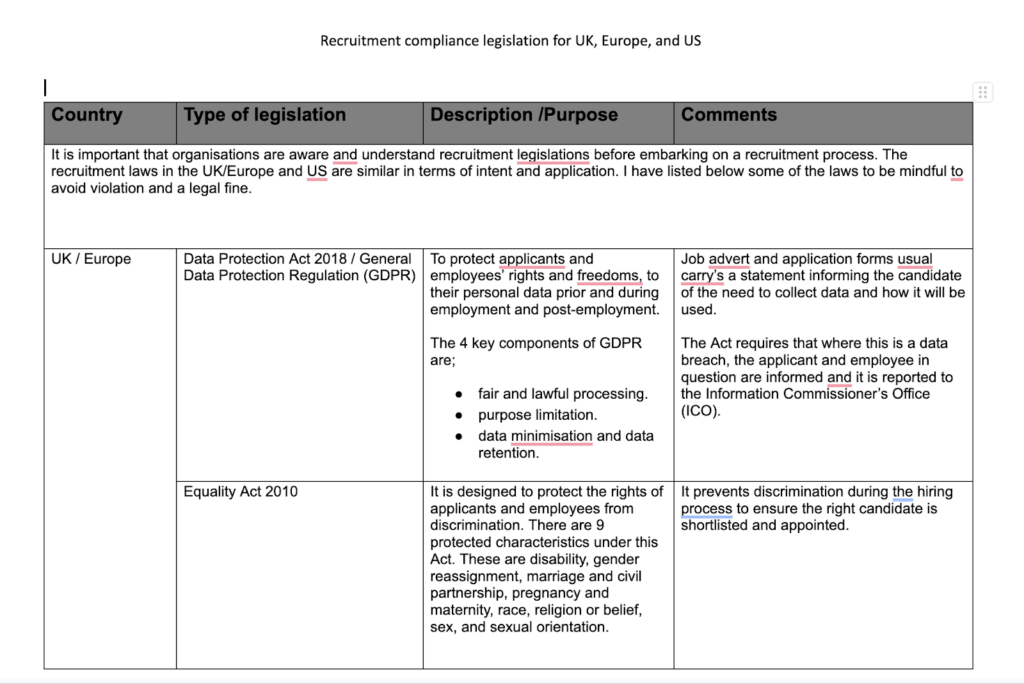For most recruiters, compliance often falls on the back burner. However, it’s extremely important if you want to avoid being hit by huge penalties, fines, and lawsuits.
In fact, if you’re found guilty of discrimination, you can face fines over $300,000.
This guide will cover what recruitment compliance is, why it’s important, key laws in the US/UK/EU, and some best practices to help you keep compliant.
What Is Recruitment Compliance?
Recruitment compliance is the process of making sure that your recruitment process follows all state, national, and internal regulations. It ensures that you don’t discriminate against candidates and respect their rights.
Recruitment compliance covers some major themes like:
- Discrimination and equal opportunity
- Workplace safety and working conditions
- Background checks
- Ban-the-box laws
- Record keeping and data privacy
- Drug testing and medical examinations
Failure to comply with recruitment compliance laws can lead to lawsuits from government agencies. For example, recently iTutorGroup settled a $365,000 lawsuit with the EEOC for age discrimination by refusing to hire females aged 55 or over and males aged 60 or over.

That brings us to the agencies that implement recruitment compliance laws. In the US, you have the EEOC (Equal Employment Opportunity Commission) and the OFCCP (Office of Federal Contract Compliance Programs).
The former focuses entirely on complaints related to job discrimination on the basis of age, sex, religion, race, national origin, disability, etc., while the latter focuses on enforcing employment law.
In the EU, you must adhere to the recruitment compliance guidelines, EU labor laws, and the EU Charter of Fundamental Rights. Individual countries also have minor adjustments in the laws, so you must watch out for that, too. Apart from that, GDPR is a big aspect of recruitment compliance in the EU, which we’ll go into detail later on.
The UK has similar labor laws to the EU too, and the DPA (Data Protection Act) is an adaptation of the GDPR specific to the UK.
Following the UK’s exit from the EU and subsequent negotiations period, a ‘non-regression’ arrangement was agreed in respect of employment law, which means that the UK has agreed to at least maintain existing levels of social protection in the field of employment.
Now discuss why you should care about recruitment compliance and its significance for your business.
Why Is Recruitment Compliance Important?
One of the obvious reasons is that companies that don’t pay attention to recruitment compliance risk facing heavy fines and lawsuits. Each year, the EEOC alone processes about 80,000 job discriminations.
Recruitment compliance is also essential for maintaining a good brand image, which is essential for attracting good talent. Put yourself in the candidate's shoes. Would you even bother applying for a job from a company that’s known for illegal recruitment and discrimination?
From the candidate's perspective, these laws ensure a fair chance of employment for them. It also lowers worker exploitation, which is good for the entire society.
Following these labor laws also gives you a higher chance of having a diverse team and the benefits that brings.
Key Recruitment Compliance Laws
Now that you know why focusing on recruitment compliance is important, let’s talk about some key laws you must consider.
The United States
Recruitment compliance is a little tricky in the United States. After all, you need to comply with all three: federal, state, and local laws.
Here are the key laws that you must take care of:
- Title VII of the Civil Rights Act: Protects employees from discrimination based on race, color, religion, sex, and national origin. This title not only covers recruitment but other functions of the HR spectrum, too, like selection, firing, management, etc.
- Equal Pay Act of 1963: Ensures that male and female employees are paid the same wages for the same work.
- Age Discrimination Equality Act of 1967: ADEA protects employees aged over 40 years from workplace discrimination. It applies while hiring, deciding compensation, providing benefits, termination, and more, to companies with 20 or more employees.
- Rehabilitation Act of 1973: It prevents programs and activities that receive federal funding from discriminating against disabled people. It’s limited as it only applies to places involving federal money. The act has various sections:
- Section 501: No discrimination against disabled individuals in federal employment.
- Section 503: Prohibits federal contractors and subcontractors from discriminating against challenged people.
- Section 504: Providing civil rights to disabled people.
- Section 505: Governing remedies and attorney fees related to Section 501.
- Section 508: Ensures the same ease of access to electronic and information technology for disabled people.
- Americans with Disabilities Act: This popular law differs slightly from the Rehab Act as it applies to private entities too with 15 or more employees. Most of the other provisions remain the same. ADA is broader and applies to disabilities in public places, too.
- Fair Credit Reporting Act (FCRA): The FCRA specifically applies during background checks in recruitment. To comply with it, you must notify candidates before requesting background checks, ask for their consent, give them the right to modify any details and give them the right to appeal if they feel it is unfair.
- Immigration and Nationality Act: You may only hire people eligible to work legally in the United States. You must verify their identity and complete the Form I-9. Employers can also not discriminate while hiring or firing based on national origin or citizenship status.
- Family and Medical Leave Act (FMLA): Entitles employees to take job-protected but unpaid leave for family or medical reasons like childbirth, caretaking, health issues, etc.
- California Consumer Privacy Act (CCPA): The CCPA is California’s version of GDPR, which allows California residents to exercise control over their personal data. During recruitment, candidates have the right to know the information you collect about them, delete personal information, opt out of their data being sold, and not be discriminated against for using their CCPA rights.
It’s essential for you to prioritize compliance with all the laws we stated above. Now, let’s move across the Atlantic and discuss key recruitment compliance policies in the UK and EU.
Europe and the United Kingdom
Most of the US, EU, and UK laws are similar in terms of intent and application. There are some minor differences in EU and UK laws post-Brexit, which we’ll discuss below:
- GDPR (EU) / DPA 2018 (UK): Protects the rights of employees regarding their personal data during and post-recruitment. Some of the key things to keep in mind are:
- You must ensure the use of collected data only for legitimate purposes
- You must ask for consent before collecting candidate data
- You must clearly state where you’ll store the data, how you plan to manage it, and how you’ll use it
- Equality Act 2010 (UK): The act prohibits employers from discriminating against employees based on protected characteristics like age, gender, marital status, disability, race, religion, sexual orientation, etc. The EU has similar regulations as a part of its Charter of Fundamental Rights.
- Immigration, Asylum, and Nationality Act 2006 (UK): As an employer, you must ensure you verify that the candidate is allowed the right to legally work in the UK before hiring them. Employing someone illegally can incur fines of up to £10,000. The EU has a similar directive to counter illegal work by non-EU nationals in Europe. You must ensure that non-EU nationals produce a residence permit or other forms of work authorization before you hire them.
- National Minimum Wage: Ensures employers pay above minimum wage. Differs in each country. For example, in the UK, it depends on age and starts at around £5.28/hr (US$6.45), whereas in Germany, it’s €12/hr ($12.72).
- Employment Rights Act 2002: An act passed in the UK concerning paternity leave and adoption pay, maternity leave and pay, flexible working, employment tribunal reform, and resolving disputes between employers and employees. In the EU, each member state has different regulations on these topics.
- Working Time Regulation: Each country sets a maximum cap on their working time. In the UK it’s 48 hours, while in France it is 35 hours.
- Contract Law: It governs employment contracts and states certain requirements. The contract should be clear, unambiguous, accepted by the employee, and legally binding.
Here’s a downloadable cheat sheet developed by Jennifer Opare-Aryee, an award-winning HR expert, with the key recruitment compliance laws across the US, UK, and Europe.

Recruitment Compliance Best Practices
Now that we’ve covered the key laws, it’s time to apply them into action to ensure compliance.
In this section, we’ll cover some best practices you must follow while sourcing candidates, interviewing them, and storing personal data.
Sourcing
Usually, the first step while sourcing candidates is drafting a job description, and that’s where things can get tricky.
The language you use in your job description is very important. It must not discriminate against any specific groups of people.
For example, regarding age discrimination, you can’t write “Looking for people under 40.”
You must also comply with ADA requirements in the US by stating the working conditions, mandatory qualifications, and essential job functions/responsibilities.
Inclusive language such as “you need to be able to move around” instead of “you need to be able to walk” can also prevent legal complications.
Next, you can include an EEO and Accessibility Statement in the US to show your commitment to creating a fair and equal workspace.

The same also applies across Europe and the UK.
In the US, some states, including California, Colorado, Connecticut, Maryland, Nevada, Rhode Island, and Washington, and cities in New York, New Jersey, and Ohio, have their own laws that require employers to disclose in job advertisements the good faith estimate of the salary range for the position.
The idea of these laws is that if the pay rate is stated upfront, it will be more difficult for employers, consciously or unconsciously, to offer different pay rates for different protected categories of people, such as offering lower pay to women or minorities.
Interviewing
Non-discrimination laws are very strict across the globe, as we discussed above. Because of this, interviewing can be a legal minefield regarding what questions you must avoid.
To avoid running afoul of these laws, you should avoid asking questions about whether a prospective employee falls within a specific age, race, gender, nationality, etc.
Instead, the questions should focus on experience, skills, and work ethic. For example, with regard to citizenship and nationality, it’s okay to ask, “Are you eligible to work in the United States?” but you should avoid asking directly what country you are from or what is your citizenship status.
According to David T. Azrin, partner and employment law expert at Gallet Dreyer & Berkey:
"The legal risk of asking questions about any of these protected categories is that, if you ask one of these questions and decide not to hire the prospect, the prospect could make a claim that your decision was illegal because you had a bias against people in that category."
The key to combat this is to create a structured interview questionnaire reviewed by a legal expert.
It’ll ensure you avoid discriminating between candidates by asking a standard set of questions and help you compare and pick the best ones easily. Apart from that, this problem is more emotional than functional.
You must train recruiters to think deeply so that they can identify their internal biases. Self-awareness is a critical yet undervalued skill in recruiting; after all, you cannot combat your biases without actually knowing what they are.
Another good practice to follow while interviewing is to have a diverse interview panel to prevent unconscious bias and make fairer decisions.
Data protection
GDPR, DPA, CCPA, and other privacy laws introduced many changes to candidate data storage and handling.
The standard set of best practices apply here, like a clear and transparent privacy policy, data processing policy, consent before data collection, etc.
An often overlooked part of these laws is that you are also accountable for the vendors you work with. If your vendor, like your ATS, recruiting software, or agency, doesn’t comply with GDPR, you’re also accountable for them.
Data retention is also an essential topic that must be communicated to candidates. After a set period, you must follow up with candidates to check if they want you to continue storing your data.
At my agency, I follow up with candidates in our candidate database every six months to ensure I have their consent to store their data.
Apart from that, make sure you store candidate data in an encrypted system and limit the number of people with access to it. Personal data breaches can lead to heavy fines.
Finally, keep extensive documentation of all your recruiting activities and decisions in case of legal scrutiny and to help improve your internal processes and systems.
Staying up-to-date and compliant with recruitment laws is crucial. Data privacy and non-discrimination are the major pillars of these laws.
This list should provide you with a good starting point for recruitment compliance. I recommend consulting with a reputed employment lawyer to ensure your organization follows all the procedures correctly. Utilizing HR compliance software can also help you enhance your recruitment compliance strategies, from sourcing candidates to storing personal data.


